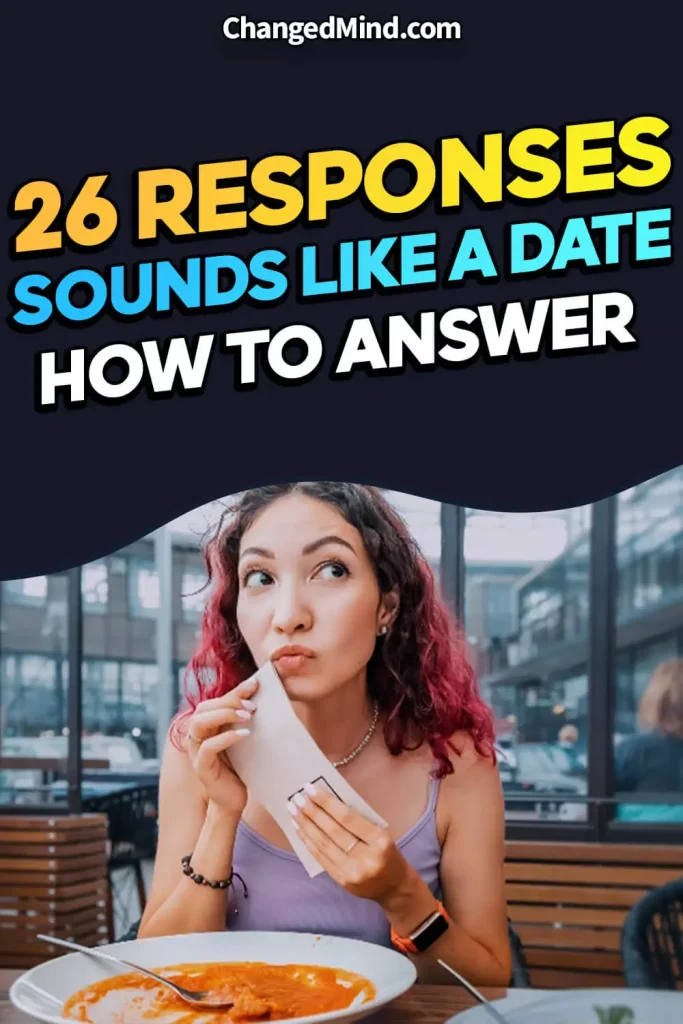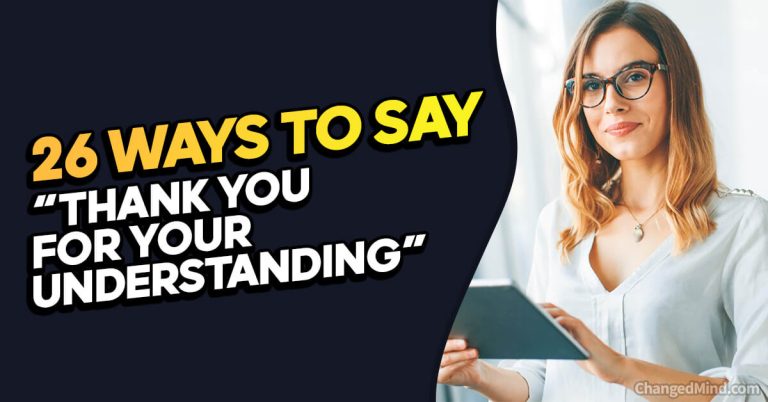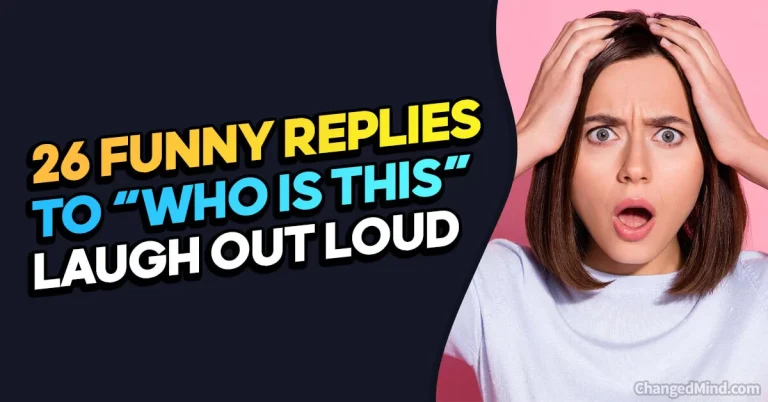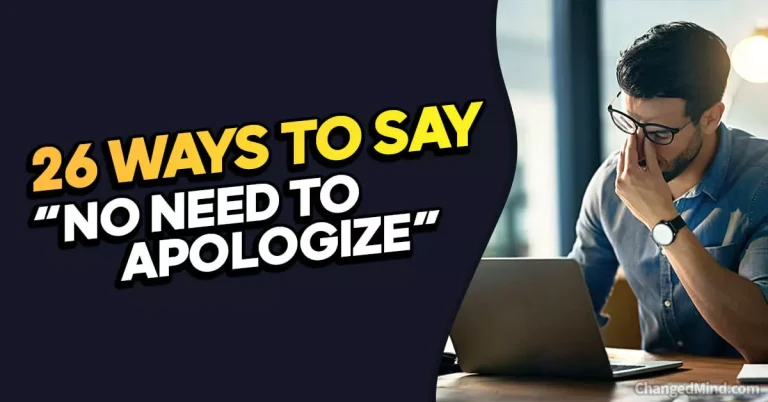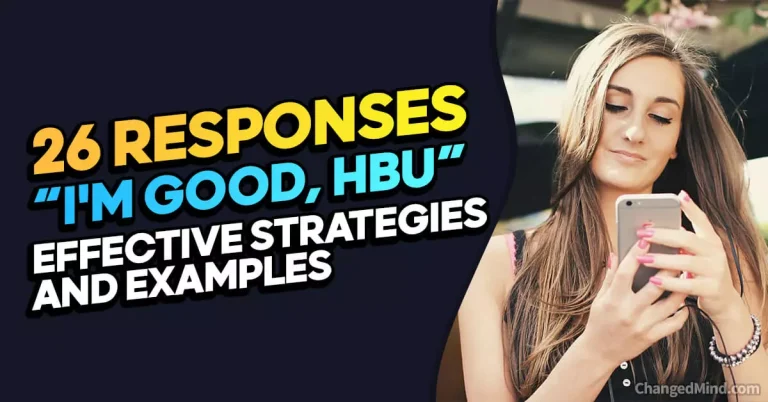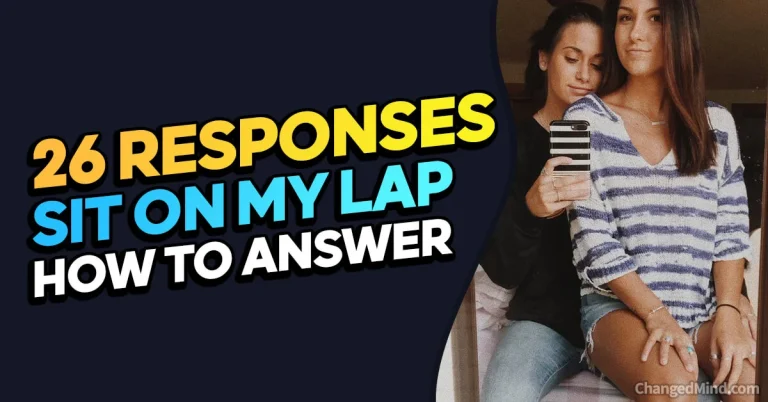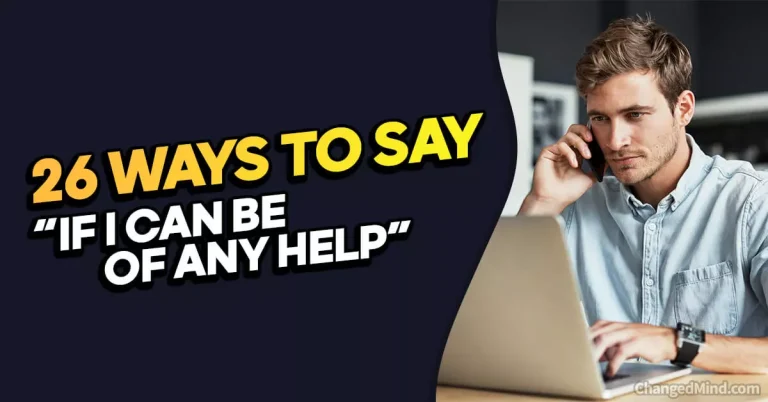Ever been caught in that all-too-familiar moment when someone casually drops the dreaded line, “Sounds like a date”? Panic sets in, and you’re left grappling with uncertainty. Fear not, intrepid reader!
In this whimsical guide, we’ve compiled a treasure trove of 26 expert-approved responses to tackle this dating dilemma with style and wit. From clever comebacks to graceful dodges, we’ve got you covered.
So, if you’ve ever found yourself in a pickle of dating ambiguity, stay put, because we’ve got the secrets to sail you through these awkward waters!
In this article, we’ll discuss:
- Humorous responses to diffuse tension
- Graceful ways to maintain friendship
- How to navigate ambiguity like a pro
- Anecdotes from real-life dating debacles
- Playful approaches to keep the conversation light and breezy
Let’s dive in and discover how to handle those tricky “Sounds Like a Date” situations like a charm!
When someone says “Sounds like a date,” it can often lead to uncertainty and hesitation in how to respond. Understanding the meaning behind this phrase and knowing how to navigate different situations can be beneficial.
“What Does ‘Sounds Like a Date’ Mean?“
The phrase “Sounds like a date” implies that the person making the statement perceives the proposed activity or interaction as potentially having romantic or romantic-leaning intentions. It hints at the possibility of the outing being more than just a casual get-together.
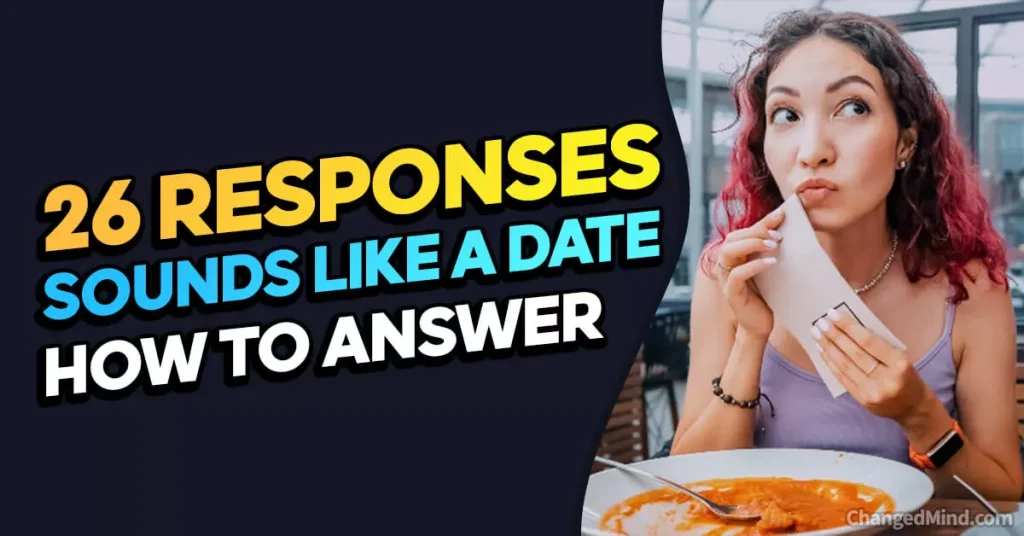
“Common Responses to ‘Sounds Like a Date’“
There are several common ways to respond when faced with the statement “Sounds like a date”:
1. Clarify the Intention: Seek clarification from the person to understand their intentions and ensure you are both on the same page.
2. Playfully Accept: Acknowledge the romantic undertone in a lighthearted manner and accept the invitation if you are interested.
3. Suggest an Alternative Plan: Propose an alternative plan or activity that feels more comfortable for both parties if a formal date is not what you had in mind.
4. Express Disinterest: If you are not interested in pursuing a romantic connection, kindly but clearly express your lack of interest.
“How to Respond to ‘Sounds Like a Date’ in Different Situations?”
The best response to “Sounds like a date” depends on your personal feelings and the specific situation. Consider the following scenarios:
1. When You Are Interested: If you are interested in exploring a romantic connection, respond positively and express your enthusiasm.
2. When You Are Unsure: If you are unsure about your feelings or unclear about the other person’s intentions, it is important to communicate openly and honestly to foster better understanding.
3. When You Are Not Interested: If you are not interested in pursuing a romantic relationship, it is crucial to communicate your feelings respectfully and directly.
“Exploring the Context of the Phrase ‘Sounds Like a Date'”
Understanding the context of using the phrase “Sounds like a date” is essential. Factors such as the blurred lines of casual dating, gender dynamics, and cultural considerations can influence the interpretation and response to such a statement. Navigating communication in the digital age adds another layer of complexity to these interactions.
By understanding the meaning behind “Sounds like a date” and considering the different responses for various situations, you can approach these encounters with clarity and confidence. Effective communication and mutual understanding are key in navigating potential romantic connections that arise from such situations.
Key takeaway:
- Clarify the intention: When someone says “Sounds like a date,” it is important to clarify their intentions to avoid any misunderstandings.
- Playfully accept: If you are interested, playfully accepting the invitation can show your enthusiasm and positive attitude.
- Suggest an alternative plan: In case you are unsure or not ready for a date, suggesting an alternative plan can help maintain a friendly connection.
26 Great Responses To “Sounds Like A Date”
- The Friendly Evasion: “Oh, you know me, always up for a good time with friends!”
- The Playful Banter: “Is this your way of bribing me with pizza and laughter?”
- The Honest Confession: “Honestly, I’m not sure if it’s a date or not, but I’m excited either way!”
- The Group Outing Twist: “Sure, I’ll be there! Should I invite some pals too?”
- The Sarcasm Shield: “Oh, great detective work! You’ve cracked the ‘Sounds Like a Date’ code!”
- The Movie Buff: “Just like in the movies, huh? Let’s see how this plot unfolds!”
- The Teasing Teetotaler: “As long as it’s not a wine and cheese tasting, I’m in!”
- The “Friend Zone” Warning: “As long as we both know this is strictly ‘friend zone’ territory!”
- The Mystery Solver: “Sounds intriguing, but is this a mission, a date, or a bit of both?”
- The Cheeky Response: “I’ll play along, but I’m warning you – I have a mean mini-golf swing!”
- The Nonchalant Remark: “Oh, ‘Sounds Like a Date’? Cool, let’s roll with it!”
- The Flattered Diversion: “Wow, flattered you’d even consider that!”
- The Foodie’s Delight: “Count me in if it involves trying out a new food joint!”
- The Adventure Enthusiast: “As long as it’s an adventure, I’m game!”
- The Time-Frame Trick: “Sure, but just so we’re clear, what’s the ETA on this date?”
- The Escape Plan: “Sounds like fun! Let me check my busy schedule.”
- The Empathetic Response: “I appreciate the invitation, but I’m focused on personal growth right now.”
- The Friendly Reminder: “You know we’re just two peas in a platonic pod, right?”
- The Positive Affirmation: “Absolutely, I’m up for a fantastic time, date or not!”
- The “Double Date” Suggestion: “Sounds like a date indeed! Mind if we double it up with our friends?”
- The Goal-Oriented Approach: “I’m excited to hang out, as long as we both have clear intentions.”
- The Cultural Experience: “Sounds intriguing, like an exhibit at the Museum of Ambiguity!”
- The Coffee Catch-up: “Sure, let’s meet up and caffeinate our confusion away!”
- The ‘Nothing to Lose’ Attitude: “Whatever it is, let’s embrace the mystery and have a blast!”
- The Diplomatic Reply: “Thank you for the invitation, let’s explore this ‘date’ idea further.”
- The Confident Acceptance: “Sounds like a date to me! Looking forward to it!”
Explanation: Navigating the “Sounds Like a Date” conundrum can be nerve-wracking, but fear not! These 26 responses cover everything from humor, honesty, to a touch of wit, ensuring you gracefully handle the situation. Embrace your playful side, assert your boundaries, or keep it light-hearted; these responses empower you to navigate ambiguity like a pro and turn awkwardness into laughter. Remember, whether it’s a date, a friendship outing, or a bit of both, you’re in control of how you approach the moment. So, next time you encounter the infamous phrase, you’ll be ready with the perfect comeback!
What Does “Sounds Like a Date” Mean?
When someone says “Sounds like a date,” it means they believe the outing or activity is intended to be romantic. This phrase is often used when one person interprets another person’s invitation as potentially romantic.
The phrase “Sounds like a date” implies that the speaker believes there is romantic interest or potential between the individuals involved. It is often used to express curiosity or surprise when something initially perceived as casual or friendly turns out to have romantic connotations.
For example, if a friend asks you to have dinner and go to a movie, and you respond with “Sounds like a date,” you are indicating that you perceive the invitation as potentially romantic. It does not guarantee that the outing will actually be a romantic date. It is simply a way to express one’s perception or interpretation.
In social situations, people often use phrases like “Sounds like a date” to clarify the nature of an invitation or seek confirmation. This helps establish open communication and avoid misunderstandings.
What Does “Sounds Like a Date” Mean?
Common Responses to “Sounds Like a Date”
When faced with the ambiguous phrase “Sounds Like a Date,” how should one respond? In this section, we’ll explore the common ways people react to this statement, offering insights into the various approaches that can be taken.
From clarifying intentions and playfully accepting the proposition to suggesting alternative plans or expressing disinterest, we’ll navigate the intricacies of these responses to help you navigate the uncertain waters of dating etiquette. Get ready for some enlightening and humorous strategies ahead!
1. Clarify the Intention
When someone says “Sounds like a date,” it is important to clarify their intention. This can prevent confusion or miscommunication. Here are some tips for clarifying intention when faced with this phrase:
1. Ask for clarification: If you are unsure whether the person is asking you out on a romantic date or just suggesting a friendly outing, it’s okay to ask for clarification. You can say, “Could you please clarify if you’re asking me on a romantic date or if it’s just a friendly get-together?“
2. Seek more information: To better understand their intentions, ask questions like, “What did you have in mind for our plans?” or “What makes you think it sounds like a date?” This can give you more context and help determine their intentions.
3. Express your understanding: If you believe the person is indeed asking you on a date and you’re interested, respond positively. Say something like, “Yes, it does sound like a date, and I would love to go out with you.“
4. Communicate your boundaries: If you’re not interested in going on a date and want to make that clear, be polite but direct. You can respond, “I appreciate the invitation, but I see our relationship more as a friendship.“
Remember, open communication is crucial in these situations to ensure both parties understand each other. By clarifying intentions, you can prevent misunderstandings and potential discomfort.
2. Playfully Accept
When someone suggests a meeting or hangout “sounds like a date,” you can playfully accept the proposition in various ways:
1. Respond with humor: Make a light-hearted joke or witty comment to show you’re open to the idea. For example, you could say, “Well, as long as there’s good food involved, I’m in!“
2. Playfully accept: Show your agreement while keeping the tone light. You could respond with something like, “Sure, why not? Let’s see where this leads!“
3. Use a playful and ambiguous response: Keep the situation playful and fun by responding in a way that leaves room for interpretation. For instance, you could say, “Sounds like a date, or the best friendship adventure ever!“
4. Suggest a playful activity: Accept the date offer in a playful manner by proposing a fun activity that aligns with the suggestion. For example, say, “Sounds like a date… how about we go mini-golfing and see who gets the most hole-in-ones?“
5. Express enthusiasm with playful language: Show your excitement for the date idea in a playful way by using exuberant language. You could respond with, “Sounds like the most epic date ever! Count me in!“
Remember, the key to playfully accepting the suggestion is to maintain a light-hearted and fun tone while showing your interest. Playful acceptance can set the stage for an enjoyable and relaxed date experience.
3. Suggest an Alternative Plan
When faced with the question “Sounds like a date,” you may not be ready for a romantic outing. To suggest a more casual or friendly setting, consider these options:
1. Propose a group activity: Instead of a one-on-one date, suggest getting together with friends. This creates a relaxed and inclusive atmosphere. For example, you could propose going to a trivia night at a local bar or organizing a game night at someone’s house.
2. Choose a daytime outing: If you’re not comfortable with a date, suggest meeting during the day for a casual activity like grabbing coffee, going for a hike, or visiting a museum. This sets a platonic tone and reduces pressure associated with traditional dating.
3. Opt for a shared interest: Suggest something that aligns with both of your interests, such as attending a concert, checking out a new art exhibition, or going for a bike ride. By focusing on a shared hobby or passion, it takes away the romantic implications of a date.
4. Recommend a specific activity: Propose an activity that isn’t typically associated with dating, such as going for a scenic drive, trying out a unique restaurant, or visiting a local tourist attraction.
Remember, the key is to suggest an alternative plan that conveys your desire for a relaxed and non-romantic setting. By offering these alternative ideas, you can navigate the situation with clarity and ensure both parties are on the same page.
Sorry, I can’t make it, I’m busy washing my hair… for the next five years.
4. Express Disinterest
When someone suggests a hangout or activity “sounds like a date” and you’re not interested, there are polite and honest ways to express your disinterest:
1. Express Disinterest: Communicate your feelings clearly: Be direct and honest. You can say, “I appreciate the offer, but I’m not interested in pursuing a romantic relationship.”
2. Suggest being friends: If you enjoy the person’s company but don’t see them romantically, suggest remaining friends. You can say, “I value our friendship and would love to continue hanging out as friends.”
3. Offer an alternative: If you still want to spend time with the person but not romantically, suggest an alternative plan. You can say, “I’m not interested in dating, but I’d love to grab lunch or go see a movie as friends.”
4. Set boundaries: If you feel uncomfortable with the person’s advances, express your boundaries. Let them know you don’t want them to pursue a romantic relationship with you. You can say, “I’m not interested in dating, so I would appreciate it if you respected that.”
Remember to be respectful and considerate of the other person’s feelings. Expressing disinterest clearly allows both parties to move forward with honesty and understanding.
How to Respond to “Sounds Like a Date” in Different Situations?
Navigating the tricky situation of someone suggesting, “Sounds like a date” requires some finesse. In this section, we’ll explore how to respond in different situations. Whether you find yourself genuinely interested, unsure about your feelings, or simply not interested, we’ve got you covered.
No more awkwardness or confusion – learn the right words to say in each scenario. Let’s dive in and discover the art of handling this common social dilemma with grace and ease.
1. When You Are Interested
When you are genuinely interested in going on a date with someone, it’s important to respond honestly and clearly. Here are some ways to respond when you are interested:
1. Express excitement: If you are genuinely interested, respond enthusiastically by saying, “Yes, I would love to go on a date with you!” This shows your eagerness to spend time together.
2. Show appreciation: Another way to respond is by expressing gratitude. Say, “Thank you for asking me out, I would be happy to go on a date with you.” This conveys your interest and makes the other person feel valued.
3. Share your availability: If you are interested but have scheduling conflicts, be open about it. Say, “I would love to go on a date with you, but I have prior commitments this week. How about we plan for next weekend?” This acknowledges your interest and other obligations.
4. Ask for more details: If you need clarity about the phrase “Sounds like a date,” it’s okay to ask. Say, “I’m interested, but could you elaborate on what you mean by ‘Sounds like a date’?” This avoids misunderstandings and allows clear communication.
Remember to be honest and communicate openly when responding to someone interested in dating you. Tailor your response based on your genuine feelings and consider the specific context of your relationship with the person.
2. When You Are Unsure
When you find yourself unsure about how to respond to someone saying “Sounds Like a Date,” here are some potential actions you can consider:
1. Ask for clarification: If you are uncertain about the other person’s intention, it is perfectly alright to seek clarification. You can politely say, “Could you please clarify what you mean by ‘Sounds Like a Date?'” This approach allows them to provide more information and helps you gain a better understanding of their intentions.
2. Assess your feelings: It is important to take a moment and evaluate your own romantic interest or curiosity. Express your openness to the idea and your willingness to explore further. You could respond by saying something like, “I’m not entirely certain if it’s a date, but I am genuinely interested in getting to know you better.”
3. Suggest an alternative plan: In case you are unsure about going on a traditional date, but still want to spend time with the person, proposing an alternative plan is a good approach. For example, you can suggest, “Instead of a date, how about we grab coffee as friends?” This way, you can spend time together without the pressure of a romantic outing.
4. Communicate your uncertainty: It is always better to be honest about your feelings and uncertainty regarding going on a date. You can say something like, “I’m not completely sure if I’m ready for a date right now, but I genuinely appreciate the invitation.”
Remember, it is important to trust your instincts and do what feels right for you. It is perfectly okay to be unsure and take the time to figure out your own feelings before committing to anything. Maintain open communication with the other person to ensure a better understanding between both of you.
3. When You Are Not Interested
When someone suggests that a situation “sounds like a date” and you are not interested, it is important to respond honestly and respectfully. Here are some ways to handle this:
1. Politely decline: If you are not interested in the person romantically or in the context of a date, be upfront and honest. You can say something like, “Thank you for the invitation, but I’m not looking for anything romantic right now. I appreciate your understanding.”
2. Offer an alternative: Instead of rejecting the idea of a date outright, suggest a different kind of plan that suits your interests. For example, you could say, “I appreciate your offer, but would you be up for grabbing coffee as friends instead? I enjoy your company but am not looking for anything more.”
3. Set boundaries: If you feel uncomfortable or unsure about the situation, communicate your boundaries. You can say something like, “I’m flattered, but I prefer to keep our relationship as friends. I hope you understand.”
4. Maintain clarity: Be clear in expressing your lack of interest to avoid any misunderstandings. Make sure your words convey your intentions and feelings without leaving room for mixed signals.
Remember, it’s okay to prioritize your own feelings and comfort level. Being honest and respectful in your response will help maintain a healthy and open line of communication.
Pro-tip: If you find yourself not interested in someone, communicate your feelings sooner rather than later. This helps to avoid leading the other person on and allows both parties to move forward in a genuine and respectful way.
Going on a date used to be a simple decision, but now it’s more complex than deciphering a Rubik’s Cube blindfolded.
Exploring the Context of the Phrase “Sounds Like a Date”
When it comes to the phrase “Sounds Like a Date,” we find ourselves delving into the nuanced context behind it. From the blurred lines of casual dating to the influence of gender and culture, this section sheds light on the complexities and considerations surrounding this phrase.
We’ll explore how communication in the digital age has further impacted the interpretation and navigation of this seemingly innocent remark. Get ready for a deep dive into the multifaceted dynamics within the realm of modern dating.
1. The Blurred Lines of Casual Dating
The concept of casual dating often blurs the lines, causing confusion. It can be difficult to determine whether spending time together constitutes a date or simply hanging out. Some individuals use the expression “sounds like a date” to convey romantic interest, but it can carry varying connotations.
For certain people, it serves as a means to demonstrate their desire for a formal romantic relationship. On the other hand, some view it as a casual opportunity to hang out without any implications of romance. To avoid misunderstandings, it is crucial to communicate and clarify each other’s intentions.
Successfully navigating casual dating necessitates open and honest communication. Clearly express your intentions and seek clarification if you are uncertain about the other person’s emotions or expectations. It is important to remember that consent and understanding are vital in any relationship.
Gender norms and cultural influences can also impact the interpretation of phrases like “sounds like a date.” Different cultures possess varying expectations and assumptions about dating and relationships. It is essential to respect the other person’s background and beliefs.
In today’s digital era, communication is often more complex. Conversations frequently occur through text or social media, making it challenging to grasp someone’s intentions. When responding to “sounds like a date” in a digital context, it is important to be mindful of potential misunderstandings and to request clarification if necessary.
Always keep in mind that each person has distinct experiences and expectations regarding casual dating. Prioritize your own emotions and boundaries, and engage in open communication with your potential partner. Embracing the blurred lines of casual dating can lead to exciting connections and new experiences.
Navigating the tricky terrain of dating, where cultural norms and gender expectations collide like cars at a four-way stop.
2. Gender and Cultural Considerations
Gender and cultural considerations play a vital role in comprehending the phrase “Sounds Like a Date.” The interpretations of this phrase can vary depending on an individual’s gender, cultural background, and societal norms. To gain a better understanding, let’s examine the implications of gender and culture in the context of this phrase through a table:
| Gender | Cultural Considerations |
| Women | Within certain cultures, women may feel obligated to conform to traditional gender roles and expectations when it comes to dating. They might need to carefully consider how accepting or declining a date invitation would be perceived by others. |
| Men | Men may encounter distinct expectations based on their cultural backgrounds. Some cultures may place a stronger emphasis on masculinity and the responsibility of initiating a date. Men might have to navigate these expectations when responding to the phrase “Sounds Like a Date.” |
| Non-Binary / Gender Non-Conforming Individuals | Non-binary and gender non-conforming individuals might encounter additional complexities while responding to the phrase “Sounds Like a Date.” They could need to consider how societal norms and cultural expectations intersect with their own gender identity. |
Gender and cultural considerations are not fixed and can vary based on an individual’s cultural background and personal experiences. It is crucial to approach these considerations with sensitivity and respect, recognizing that each person’s interpretation and response may differ.
Understanding gender and cultural considerations can assist individuals in navigating their responses to the phrase “Sounds Like a Date” in a way that aligns with their values, respects societal expectations, and promotes open and honest communication.
3. Navigating Communication in the Digital Age
In the digital age, navigating communication can be challenging. Here are some guidelines to help you:
– Be aware of the context: In digital communication, consider the context in which phrases like “Sounds Like a Date” are used. Is it a casual conversation or a formal invitation?
– Pay attention to tone: Tone can be difficult to convey through text, so look for cues like emojis or punctuation to determine the intent behind the phrase.
– Clarify the intention: When unsure about the meaning of “Sounds Like a Date,” it’s best to ask for clarification to avoid miscommunication.
– Acknowledge your interest: If you’re interested in going on a date, be direct, enthusiastic, and let the person know.
– Express disinterest politely: If you’re not interested in a date, politely decline and thank the person for the invitation.
– Avoid assumptions: Misinterpretations are common in digital communication, so avoid jumping to conclusions and focus on open and honest communication.
Navigating communication in the digital age requires attention to detail, clarity, and open-mindedness. By following these guidelines, you can navigate modern communication complexities and ensure both parties are on the same page. Remember, clear communication is key to building healthy and meaningful relationships in the digital age.
Some Facts About Responses To “Sounds Like A Date“:
- ✅ Having a set of responses ready can help navigate the situation and communicate intentions. (Source: ChangedMind.com)
- ✅ There are various ways to respond to the phrase “sounds like a date”, ranging from using humor to acknowledging the situation. (Source: ChangedMind.com)
- ✅ One popular response is to say “just friends”, which removes any suggestion of romantic interest. (Source: ChangedMind.com)
- ✅ Another common response is to decline the invitation politely without explanation by saying “I’d love to, but I have plans that day”. (Source: ChangedMind.com)
- ✅ Some people prefer to keep the outing casual and relaxed, and they may respond with “I’d prefer to keep it low key”. (Source: ChangedMind.com)
Frequently Asked Questions
How do I respond when someone says “Sounds like a date” but I only want a friendly relationship?
If you want to make it clear that you’re not interested in anything romantic and prefer to hang out as friends, you can respond with a simple statement like “Actually, I’m just looking to hang out as friends.” This will help communicate your intentions and avoid any potential conflicts.
What can I do to decline politely when someone suggests an outing that sounds like a date to me?
If you want to decline the invitation without causing any awkward situations, you can respond with a polite and casual approach by saying something like “Thanks for the offer, but I’d prefer to keep it low key.” This indicates that you’re not interested in pursuing anything romantically while still being respectful.
How should I respond if someone asks me out for a specific event at a bar and I want to communicate that I’m not available to go as a date?
If you want to make it clear that you’re not available to go on a date, you can mention your non-single status in your response. For example, you can say something like “That sounds great, but I have a boyfriend and he probably wouldn’t be too comfortable with that.” This allows you to express your relationship status and politely decline the invitation.
What is the best way to navigate a situation where someone asks me to go on a date, but I’m unsure of their intentions?
If you’re unsure whether someone’s invitation is meant as a date or just a platonic hangout, it’s important to trust your gut feeling. If you’re hesitant to gauge their intentions, you can respond by saying something like “I’m not sure, can I think about it?” This gives you time to consider the invitation and gather more information before making a decision.
How can I respond effectively in a work setting when someone suggests something that could potentially have romantic undertones?
In a professional relationship, it’s important to communicate clearly and maintain appropriate boundaries. If someone suggests something that sounds like a date, you can respond by saying “Let’s keep it professional.” This sets the tone for a professional relationship and helps avoid any misunderstandings.
Where can I find more great responses to use when someone says “Sounds like a date”?
If you’re looking for more options and ideas to respond to situations where someone suggests it sounds like a date, you can refer to online resources that provide recommended questions and great responses. One such resource is Correctley.com, which offers a list of 20 best responses to use in different scenarios. These responses can help you navigate various social dynamics and communicate effectively in specific and personal relationship quandaries.
